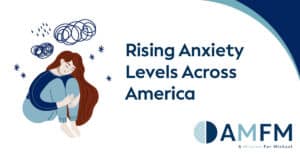Have you ever seen a friend in a relationship that was clearly toxic and unhealthy, and wonder why they chose to stay with that partner? It’s often easier for people outside of a relationship to recognize the signs of an abusive relationship.
Trauma bonding, which is a major part of abusive relationships, is an example of something that is difficult to detect from inside a relationship. This is due to the constant manipulation at the hands of a narcissistic partner.
But what exactly is trauma bonding? Why do people trauma bond and continue to stay with a manipulative partner?
We’ll answer those questions as well as the common signs of trauma bonding so you can recognize it and stop it in its tracks.
What Is Trauma Bonding?
Trauma bonding occurs when a narcissist repeats a cycle of abuse with another person which fuels a need for validation and love from the person being abused. Trauma bonding often happens in romantic relationships, however, it can also occur between colleagues, non-romantic family members, and friends.
The narcissist will condition someone into believing that these toxic behaviors are normal. As the bonding deepens, the person being abused will feel more and more like they need validation from the abuser, giving the abuser more power and leading to further manipulation.
Oftentimes, it can take months or even years to realize you are in this type of toxic relationship. That’s why it’s important to understand why trauma bonding occurs and what the common signs are.
Why Do We Do It?
Trauma bonding occurs as a result of reinforcement at the hands of the abuser.
The manipulative person will alternate abuse with really positive experiences which leads to the development of a trauma bond. Over time, the trauma bonding will strengthen, making it more and more difficult for a person to recognize clear signs of emotional or physical abuse. The abuser will positively reinforce certain behaviors, basically training someone to stay and continue to give their love to them.
Sometimes, a person may be fully aware that they are with a toxic person, but they are so conditioned to continue forgiving them that it can be nearly impossible to finally leave, causing them to feel stuck.
Common Risk Factors
While trauma bonding can happen to anyone, there are some common risk factors that can make it more likely for a person. These include:
- Poor mental health
- Low self-esteem
- Financial difficulties
- No support system
- Past trauma
- History of being bullied
- Lack of personal identity
These risk factors make it more difficult to recognize signs of toxicity and can also make a person more susceptible to manipulation in a relationship.
Recognize the Signs of Trauma Bonding
It’s important to be able to recognize some of the most common signs of trauma bonding so you can have a better understanding of what might be happening to you or a loved one. Here are some signs that a person is experiencing trauma bonding.
Feeling Indebted to the Abuser
An abuser always wants to be in control, and one way to do that is to make someone feel as though they are always indebted to the abuser. This can come in many forms such as domestic violence but they all have the same effect which is the person being abused will feel bad for not making up for the indebtedness they feel.
For example, if you made a mistake early in the relationship that hurt your partner, they might hold that over your head for months to make you feel bad and like you need to make it up to them. They can make you feel terrible about even the smallest of things, and condition you to feel ashamed for past behaviors.
Protecting the Abuser
Oftentimes, the abuser will have their own serious mental health issues that they are struggling with, and this can lead the person being abused to feel the need to care for them or protect them. The abused individual will go up against other people who speak out against the partner and often push people away who aren’t supportive of the relationship.
Narcissists love this behavior and will often reinforce this in the person being abused by showing them love and affection following an act of protectiveness.
Covering Negative Emotions
Negative emotions are prevalent in people who are being abused, but they don’t want anyone else to notice them. They especially don’t want their abuser to notice their emotions because that often leads to the abuser playing victim and making the partner feel guilty for how they feel.
If you find yourself hiding your negative emotions and only letting them out when you’re completely alone, that can often be a big red flag that you are experiencing trauma bonding.
Friend and Family Aren’t Supportive of Your Relationship
It’s one thing if you have parents who feel like no one deserves to be with you and will speak out against anyone you date. But it’s an entirely different thing to have all of your friends and family tell you that they don’t like your partner and don’t think the relationship is good for you.
At first, you’ll likely feel protective and as if they just don’t understand. But the reality is that these people know you more than anyone and can see a change in your behavior that even you haven’t noticed. That’s why listening to your friends’ and family’s concerns is vital to recognize that you’re in a toxic relationship that has led to trauma bonding.
Playing Multiple Roles for the Abuser
If you find that you are “wearing several hats” for your abuser, meaning you play a number of roles for them, that can be a red flag. For example, they might look to you to be their lover, best friend, parent, therapist, teacher, babysitter, etc. By taking on all of these roles, you are being taken advantage of and developing an even stronger trauma bond because you feel like you need to be all of these things to the abuser. It also leads to a weakened identity, making it more difficult to recognize negative changes in yourself.
Don’t Let Trauma Bonding Control Your Life
Traumatic bonding can have a terrible effect on not only yourself but also on other relationships you have with family and friends. By understanding what trauma bonding is, who is most at risk of doing it, and what the common signs are, you can recognize red flags and protect yourself from abusive partners and abusive people moving forward. If you think you are experiencing trauma bonding, it’s important to seek help so you can safely move forward with your life. Take a look at our program information page to learn more about what services we offer and how our programs can help you overcome trauma bonding.









